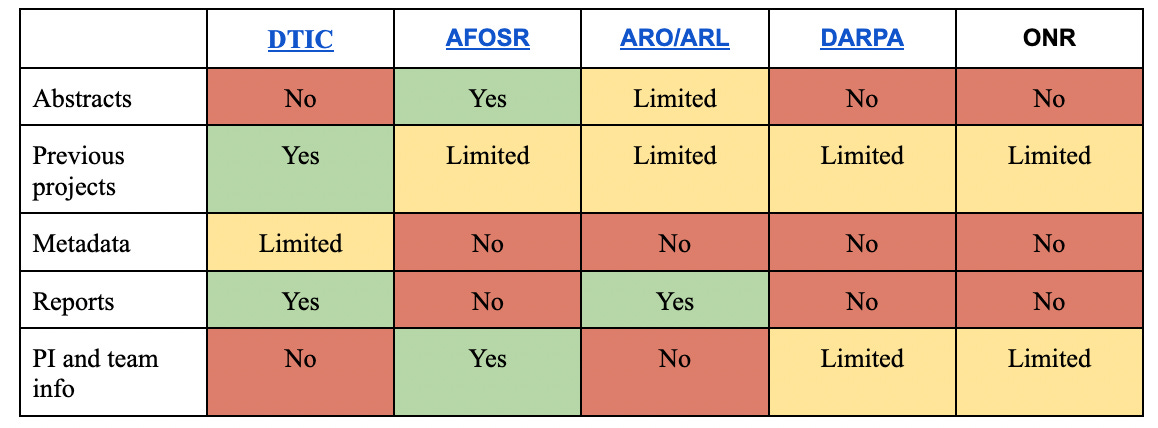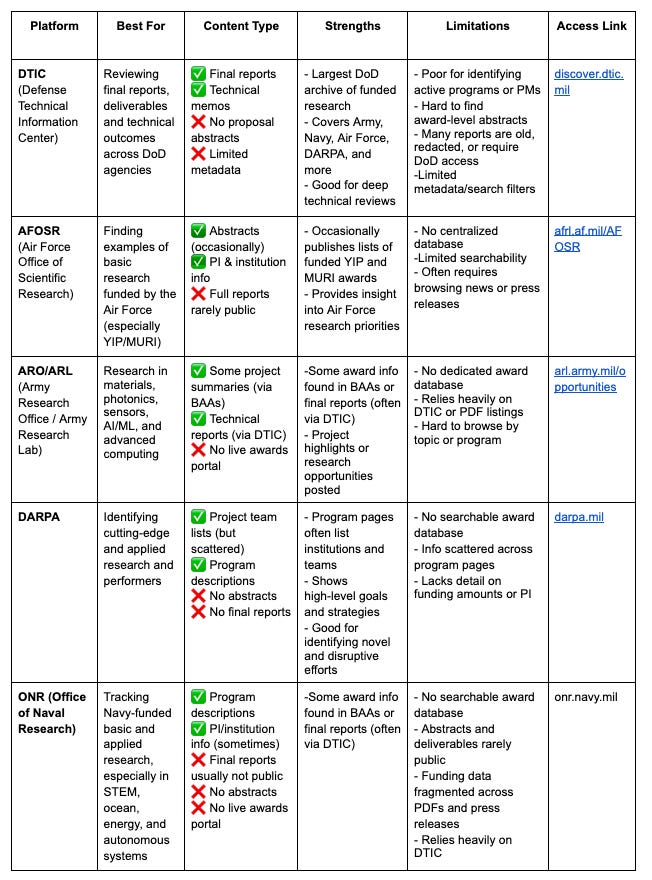Tech Transfer for Defense (TT4D): How to Find Previously Funded DoD Research Projects
by Jeff Decker, PhD and Nilay Papila, PhD Technology Transfer for Defense, Stanford University
George Santayana once wrote that “Those who cannot remember the past are condemned to repeat it.” This quote applies to researchers in search of research funding. Researchers that understand past funding are destined to win future awards.
Whether you’re preparing a Multidisciplinary University Research Initiative (MURI) proposal or applying to the Young Investigator Program (YIP), reviewing previously awarded research projects will improve your probability of success by helping you identify program fit, funding scope, and research priorities.
Why Review Past DoD Awards?
Securing DoD funding is highly competitive—especially for work in emerging or interdisciplinary fields. Reviewing previously funded projects offers more than historical context; it gives you a practical edge. By exploring past awards, you can:
Identify which agencies and directorates fund research in your area of expertise.
Understand the technical focus areas and terminology each program emphasizes.
Assess the typical scale, structure, and duration of funded projects.
Discover potential collaborators, subcontractors, or teaming partners.
Avoid duplicating existing work and instead propose clearly differentiated ideas.
Align your concept summaries, white papers, and full proposals with agency expectations.
In short, reviewing past awards is not just background research, it’s also a critical step in writing competitive proposals.
Program managers love research that is “similar but different.” Similar in the sense that it fits within their research portfolio, but different enough where they aren’t funding two of the same project at different campuses. Reviewing previous awards will allow you to take something that has already been funded and either add a new twist to it or build on its research outcomes.
What to Look For -and How to Frame Your Search
Before diving into award databases, it helps to frame your approach. Are you trying to identify a program manager (PM) whose portfolio matches your research? Or are you interested in a specific program and want to see what’s already been funded under it?
A "PM-first" approach is helpful when you have a broad research theme and want to locate a champion within DoD. Start by scanning project abstracts and award reports to identify names of PMs repeatedly associated with work in your field. Once you identify a potential match, study that PM’s past awards to understand how your work might complement or build on their portfolio.
Conversely, a "program-first" approach is ideal when you're aiming for a specific call like MURI, YIP, or a known Broad Agency Announcement (BAA). In this case, review past awards made under that exact program to learn what has succeeded in the past: topic areas, institutions, collaboration models, and technical framing. Use that intelligence to position your proposal accordingly.
Either way, focus on extracting the following information from award records:
Award abstracts (to understand project goals and keywords)
PI details and institutions (to identify collaborators or competing teams)
PM names or sponsoring directorates
Project duration and funding level
Terminology and focus areas emphasized in successful proposals
Below are two tables to support you in your search.
Key Resources for Finding Previously Funded DoD Research
Links: DTIC | AFOSR | ARO/ARL | DARPA | ONR
Comparison of DoD Research Databases
Access Links: discover.dtic.mil | afrl.af.mil/AFOSR | arl.army.mil/opportunities | darpa.mil | onr.navy.mil
Conclusion: Turn Research Into Strategy
Navigating DoD funding can be complex due to its decentralized structure. But with the right tools-DTIC, and agency portals, you can gain a clear view of where your research fits within national defense priorities.
Start by choosing your approach: identify a PM whose work overlaps with yours or study a specific program’s history of awards. Use the tools above to uncover funding trends, proposal language, and positioning strategies. Whether you're preparing a MURI, YIP, or BAA response, this background research strengthens both the substance and positioning of your proposal.
Over time, building a habit of reviewing past DoD-funded work helps beyond proposals. It can inform strategic planning, lab growth, hiring, and interdisciplinary initiatives that improve your long-term competitiveness for federal research opportunities.
___________________________________________________________________
Technology Transfer for Defense (TT4D) at Stanford University specializes in matching Defense Department funding with academic research projects. In the past six years, TT4D has worked with numerous faculty members at more than a dozen universities to help them win Defense Department grants and with the Office of Naval Research, totaling more than $13 million, to support research funding and transition academic technologies from lab to defense capabilities. TT4D is based at Stanford University and is run by Jeffrey Decker, PhD, program director, Precourt Institute for Energy, Fu-Kuo Chang, Professor of Aeronautics and Astronautics, and Nilay Papila, PhD, senior program manager, Precourt Institute for Energy. To contact the TT4D team, visit techtransferfordefense.stanford.edu.
To read previous TT4D posts, see:
TT4D: Tech Transfer for Defense's 4-Step Guide to Winning Defense Department Research Funding
TT4D: How to Find Existing Research Broad Agency Announcements
TT4D and Researchers Looking for Government Financing $$$: Prepare and Submit Your Application
TT4D: Maximizing Your Event's Impact with Army Conference Support
TT4D: Frequently Made Mistakes in Research Proposals: What to Avoid for Success
How to Effectively Complete a Quad Chart for Government Research Projects
Spinning Out Defense-Funded Innovations: A Guide for Researchers-Part 1
Spinning Out Defense-Funded Innovations: A Guide for Researchers-Part 2
Using ChatGPT for Research Proposals: A Practical Tool for Defense-Focused Faculty



